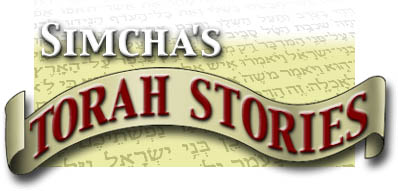Simcha's Torah Stories - Ki Sisa

Parshat Ki Sisa
THE SIGN
What a beautiful day to walk home from school together, Avi.
It sure is Chaim. The air is so fresh and clean.
Do you mind if we stop at the grocery store for a minute? My Mom asked me to pick up something for her.
Why not? There is Frankel's Deli across the street.
Look at that Avi. The door is locked and the deli is all dark inside. It looks as if he's closed up.
I hope everything is okay. Mr. Frankel is a really nice man.
A few days later, the boys walk by the deli again.
Hi boys! How are you doing?
Great Mr. Frankel. How are you?
Just fine, boys.
That's good. We were a little worried when we came by a few days ago. The store was closed.
Thanks for your concern boys. I was in the hospital for a few days. Nothing serious, thank G-d. Now I am feeling better. Now the business is going as strong as ever.
We're happy that both you and your store are doing well.
Do you see that sign above the door of my store?
Sure, Mr. Frankel. It says, "Frankel's Deli".
Right, boys. Just remember this. As long as that sign is up, the store is still in business. If G-d forbid, that sign comes down, then you know that I had to close down the business.
Mr. Frankel, that is just what the Chofetz Chaim said!
What? He never came into my store. He never even saw this place. He passed away long before I was even born.
Mr. Frankel, you have a good sense of humor. We are talking about a parable that the Chofetz Chaim told about a store. It is based on a verse in this week's Torah portion. "Between Me and the Children of Israel it (the Shabbos) is an eternal sign" (Shemos 31:17). Shabbos is a sign between G-d and each and every Jew. It is that Jew's identification that his soul is part of the Jewish Nation. As long as he keeps the Shabbos, he identifies himself as a part of the Nation of Israel. Just like your store, Mr. Frankel. That sign is your identification. As long as the sign is up, we know that you are still in business. Even if the store is closed for a little while. If you take down the sign, then we know that the business has closed down. Similarly with Shabbos observance. If a Jew, G-d forbid, no longer observes the Shabbos, then he has taken down his sign.
Boys that's a great parable. I would love to spend more time talking with you, but today is Erev Shabbos, and it is getting late. I still have many preparations to do before I welcome the Shabbos Queen.
So do we, Mr. Frankel. You should have lots of success in your business, and have a great Shabbos!
You too boys. Good Shabbos!

CHAIR OR BENCH?
"Jack, you're a great carpenter."
"Why thank you Mr. Shore."
"I have a job for you, if you are interested. Here is some wood that I bought. I would like you to make a chair out of this wood."
"No problem, Mr. Shore. Come back in a few days and it will be ready."
Mr. Shore returns a few days later.
"Hi Jack! How are you?"
"Fine, Mr. Shore. Your bench is ready. It's right over there."
"Bench? What bench?"
"The bench that you asked me to make from the wood."
"I didn't ask for a bench, Jack. I asked you to make me a chair."
"I'm so sorry Mr. Shore."
The question is who keeps the bench, Jack or Mr. Shore.
If Jack keeps it, does he pay for it? If so, how much?
If Mr. Shore keeps it, does he pay for it? If so, how much?
(This puzzle is from Tractate Bava Kamma, page 101a).
ANSWER TO LAST WEEK'S PUZZLE
WHO BROKE THE RADIO?
"The view sure is nice up here on the roof of the building Yossie."
"Beautiful Chezi. I'm glad that I brought my radio so that we can listen to music. It helps drown out the noise of the workers' power tools."
Suddenly, one of workers walks over to Yossie, grabs his radio and throws it off the roof.
"I don't like that music!" the worker growls.
"But you didn't have to break my radio!"
"I didn't break it. I just threw it off the roof."
With that, the two lean over watching the radio fall. A worker on the ground floor sees it falling. Just before it hits the ground, he smashes it with his hammer.
"You see, I didn't break it. That man at the bottom broke it."
"But you'll have to pay."
"No I won't. I didn't break it."
Yossie runs downstairs and quickly finds the worker who smashed his radio.
"You have to pay for my radio"
"No I don't. It would have surely broken anyway in another second. I didn't break it any more than the fall would have."
The question is: who pays for Yossie's radio?
(This puzzle is from Tractate Bava Kamma, page 17b).
The Answer is:
There are four major opinions among the Talmudic commentators.
- The worker who threw the radio off the roof must pay. He preformed an action that would inevitably break the radio.
- The worker at the bottom must pay for the radio. He broke it. Although it surely would have broken had he let it go, at the time it reached him it was not yet broken. Therefore, he broke it and he must pay for it.
- They must split the cost, because we are not sure who is responsible.
- Neither must pay. The one who threw it off the roof, put it into a situation where it would surely break. Consequently, it lost all of its monetary value. A radio that it sure to break is worth nothing. Therefore, when the worker at the bottom broke it, he broke a radio that was worth nothing. The top worker does not have to pay because he did not break it. And the bottom worker does not have to pay because he broke something that was worthless.
The Rema in Shulchan Aruch Choshen Mishpat 390:5 rules like the first opinion, that the worker who threw it off the roof must pay.
Ohr Somayach's Youth Page r
Editor: Reuven Subar
General Editor: Rabbi Moshe Newman
Production Design: Michael Treblow






